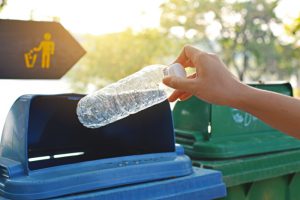It’s summer and it’s definitely hot out there – which means lots of us will be sipping ice cold drinks through plastic straws, grabbing plastic bottles of cold water on the go and picking up disposable cutlery or items packaged in plastic for picnics outside. In other words, there are a lot of single use plastic items that have become routine to use, but that you can easily take steps to avoid. This month is Plastic Free July, a campaign to raise awareness about the importance of ending our reliance on plastics, which has millions of participants across more than 150 countries worldwide today. Keep reading to find out what you can do to avoid plastics this July.
Why refuse plastics? Plastics do not ever fully biodegrade and as we’ve seen from documentaries such as Blue Planet II and media coverage of divers swimming in plastic polluted seas – this plastic is detrimental to our land and marine ecosystems. It is estimated that since its introduction, around 6.3 billion tonnes of plastic has been produced worldwide only 9% of the plastic ever produced has been recycled – with almost all of it still in existence today.
What can you do? It can seem overwhelming at first, and difficult to know where to start (once you realise that plastic items are everywhere!), but there are a lot of small changes you can make to reduce your reliance on plastic. Here are our 5 most important tips:
- Invest in a reusable bottle and carry it with you everywhere you go! A million plastic bottles are bought around the world every minute – don’t let yours be one of them.
- Use a reusable shopping bag – with plastic bags costing you 5p and costing the planet every time you use one, it’s a no brainer! So no to single use plastic bags when you shop.
- Use a reusable a coffee cup to avoid disposable coffee cups which have a plastic film lining which prevents them from being recycled. Most coffee retailers now offer a discount when you bring your reusable cup so you can save money and do your bit for the planet! Click here to see where you can get the best discounts.
- Buy loose fruit and veg and other food items – buying your food loose and not in packaging will avoid single use plastic wrappers and save you money on your food shop, as big bags of fruit and veg cost you money when they inevitably go off before you can use them. Buying less, outside of plastic packets it cheaper and better for the planet.
- Carry around Tupperware boxes and reusable cutlery, which will allow you to be waste free while you eat on the go! Single use takeaway items such as plastic cutlery and takeaway containers can’t be recycled, and so every time you use them you add more waste to landfill or to our marine and land ecosystems.
Reward your staff for reducing plastic use
Our Jump programmes reward employees for their positive environmentally sustainable actions, such as reducing their plastic use. By using gamification, team and individual prizes and an innovative online platform and web app, Jump successfully creates mass engagement in environmental and wellbeing issues. At Swansea University Jump has helped employees save over £9,000 by using reusable cups, with over 36,000 disposable cups avoided!
For more information or to request a case study get in touch at [email protected]








